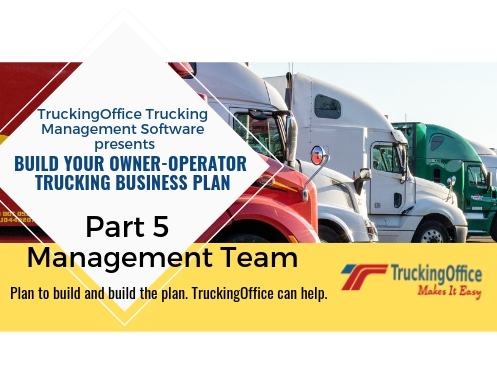Your business plan will have
- an executive summary
- a company overview
- a marketing plan
- a set of goals or milestones
- a list of the current staff
- a financial plan.
Each of the separate parts helps to create a full picture of your trucking business and will help you determine what you need to do next to grow and succeed.
There are business plan software programs that you can buy online to help you through this process. We don’t have any to recommend, but that doesn’t mean much. You may find one that helps you – let us know!
We’re going to break down each part of the business plan and how we see it apply to your owner-operator trucking business.
The Current Management Team
After the last section, this section will be far simpler. You can even do thing part at the same time as your work on the goals and milestones section. It makes sense to put them together at the same time because what goals you set may change how you manage your trucking business.
As the average owner-operator, there’s not a lot of staff. The trucker. Maybe someone at home who’s managing the accounting. If you have a second truck, then there’s another driver.
The organization of that business is pretty linear. The trucker decides loads, the person at home sends out the invoices and pays the bills. The spare driver gets paid for the loads he or she hauls. Or maybe the at-home member gets the calls from the brokers and arranges the loads.
Managing the Owner-Operator Business
That organization needs to be written out and explained. That’s pretty simple and might not take much time. But if you’re setting goals to improve the business, will that structure stay in place? Or might there need to be more staff?
In the owner-operator husband and wife business, an increase in loads also increases the time needed to manage the home office. With TruckingOffice trucking management software, that’s easy to control since all of the billing is tracked by the software – outgoing invoices and incoming payments are tracked, along with late pays. With increased loads, it’s not just about invoices and accounting: it’s also about tracking BOLs, receipts, expenses, permits, and all the other tasks.
While one spouse may be on the road more, the at-home spouse will have to do in general. Is adding another staff person a solution? Or will a strong trucking software offer the solution? We can’t answer that for you, but we will recommend you check out TruckingOffice trucking management software to determine how it can help you with your trucking business.
Growing the Team
Adding a Driver
We know of many truck drivers who bought their own rigs and started their own businesses. We also know of many of them who went on to buy extra trucks and hired drivers. We call them Fleet Builders. It’s still an owner-operator business because the owner is still hauling freight, but there’s a new dimension of management. Managing a driver adds extra complexity: keeping track of their licenses, medical tests, and settlements (pay) takes time. Fortunately, TruckingOffice handles this for you, but the simple fact is that another driver means more paperwork.
As you plan for your future and write out your business plan, especially if you’re looking for financing to expand, keep this new hire in mind before you post the job. It’s different from managing just yourself.
Adding a Mechanic
If you’re an owner-operator, adding a mechanic to your staff is silly. You’re not going to hire a mechanic if you’re on the road for days at a time. But you might want to consider your mechanic as a member of your team. Build a good relationship with a mechanic that you trust. Schedule your regular maintenance with them and make sure you pay them on time. Why? Because the time may come when you need their help – and being a preferred customer gets preferred treatment. When you’re in the market for a new rig, a mechanic will be your right hand to help you pick a good used vehicle. In fact, they might even be the matchmaker that finds your next truck.
Adding a Tax Accountant
Who wants to do taxes?
Not us, that’s for sure. IFTA and IRP? Those are handled in less than a minute with reports from TruckingOffice. But when it comes to the IRS and April 15th, maybe hiring a good tax accountant is a smart idea. All of the extra tax forms that have to be filled out as a small business owner and as a trucker might push someone over the edge. Hiring a tax accountant who understands the ins and outs of this year’s trucker tax filings may be worth every penny (which is deductible, right?)
It’s always about relationships.
An owner-operator business has to build good relationships to succeed. It’s about
- taking care of the people who take care of you
- impressing the customer with excellent service
- working the people who keep you on the road.
When those relationships are in balance and strong, your business will grow.
Management List and Plan
This part of the business plan won’t take long to write but may take you to places in your planning you never expected. Keep your goals in mind as you look toward building your management team. Celebrate when your team grows – it means your business is successful.







Recent Comments